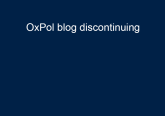That was the title I was given to talk about for a conference organised by the European Commission in February. It was hard not to be defensive: many people, academics and NGOs anticipated round the water cooler that ‘a lot’ of people might come, but anything more specific, even if it is a range of numbers, demands particular methodological tools. It is not just picked up along the way. Scenario building is a useful, but narrow field of academic research and most academic researchers don’t try to predict the future.
In one sense some of the challenges facing Europe have been flagged by ‘Cassandra’ academics in reports and articles for years. Even before the Arab Spring the Middle East and North African region was being singled out as a potential source of migrants, and there were warnings that Middle East’s states of reception were over strained and under considerable pressure from the challenges of coping with displacement. Academic work has analyzed (irregular) migration to Europe as a longstanding structural phenomenon (Sciortino 2010) and this has examined how outsourcing immigration controls has potentially been storing up problems. The Dublin system is a clear example of such a failure, and the longstanding analyses of the shortcomings of the Dublin system and recommendations for its root and branch reform (Guild 2014) have been largely ignored. It is well known that ‘geopolitical shocks’ such as the war in Syria lead to human displacement and mobility, and that the current refugee regime fails to protect those fleeing generalized violence (Van Hear and Ruhs 2012). Research has anticipated the unsustainability of attempting to contain people who are displaced as a result of geopolitical shocks and the structural reasons for and consequences of lack of collaboration and discretion, but these are longstanding challenges that policy does not want to hear.
There are important cultural differences between academia and policy making: differences in time frames, in the attitudes and responses to quantitative and qualitative findings, but also in whose interests we think we are serving. Academic researchers might have to juggle the interests of the funders, the research subjects and gatekeepers, our national governments, the taxpayer, a vaguer general good and a commitment to the integrity of knowledge. The ideal of course is to serve all these, but migration is a field fraught with conflicting interests. Forecasting numbers for instance may on the one hand facilitate a planning process that ensures adequate capacity for newcomers, especially at a city or local level, but on the other it can feed a frenzied public discussion for whom any number is too many. At the national level then it might be seen as threatening the interests of research subjects whom researchers have an ethical requirement not to harm. Ultimately research, however technical, cannot depoliticize political debates and decisions.
These differences do not mean that academic research cannot be useful and productive for policymakers, but they suggest to me that we might attempt a more sustained and creative relation between academics and policymakers. For example, academic research can inquire: Why is the ‘migration crisis’ a problem? Is it the deaths? Or that there are just too many people to accommodate? Or populist responses? Or the divisions exposed between different states of the Union? This is not to suggest that these are unrelated questions, but to point out that where our starting point is, and its consequent priorities are absolutely critical if we are to evaluate suitable responses. What are we trying to solve? To take a politician’s lead, last week Prime Minister Valls described the migrant situation as “a crisis that endangers the European project.” As an academic this is fascinating to me. I read it as suggesting that, as well as a migration crisis confronting Europe, what is unfolding is what Sam Kriss has called a European crisis confronting migrants: A multi-dimensional European crisis of solidarity between member states, many of which are struggling with austerity and with rapidly diminishing state capacity. A crisis that is bringing into question not only the principles of asylum and of free movement within the European Union but Europe’s very idea of itself as a space of liberal values, freedom, moral equality and human rights.
For over twenty years the outsourcing of migration controls has meant that European publics have been protected from the practical reality of forced displacement and economic desperation that is now showing up on holiday beaches. The question, “what is our moral obligation to the stranger?” has haunted European philosophical and religious thought for centuries. The tension between sovereign self-determination claims on the one hand and adherence to universal human rights principles on the other is arguably a constitutive feature of liberal democracy. Scholars like Benhabib have argued that the demos constitutes itself through more or less conscious struggles of inclusion and exclusion, and this is the struggle that is being waged in a very real way at Europe’s borders. While policy making and public opinion is often treated as pragmatic and atheoretical it is guided by concepts and histories of ideas deeply rooted in the European tradition. Excavating these can be of considerable value and academic researchers need to make far more effort in this kind of work. Social science, politics and economics must speak to philosophy, political theory and history. We need to think about how we can use the past to develop concepts that illuminate the present. For academics this speaks to the problem of disciplinary siloes and for policy, the need to engage with disciplines that are often sidelined in the rush for impact.
This post originally appeared on the COMPAS blog.







